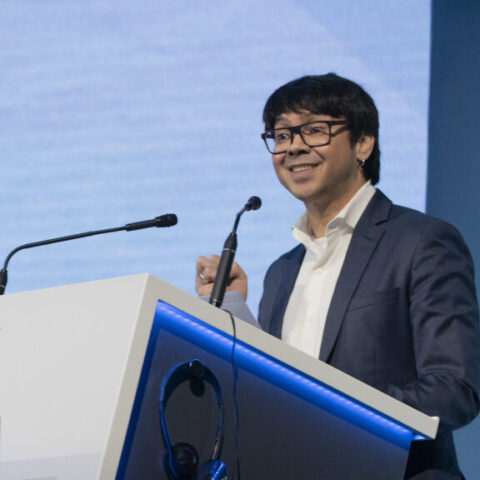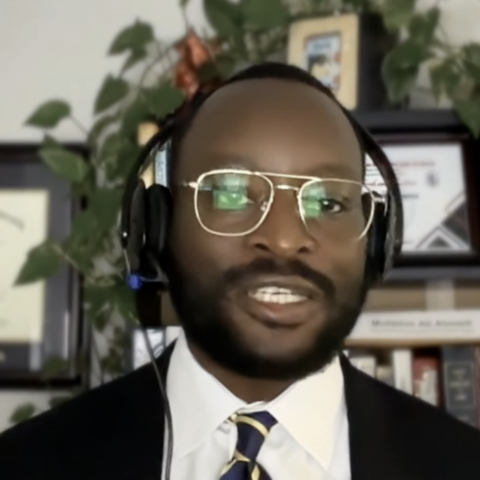
Alexander Ntoko, Chief of the Operations and Planning Department at the International Telecommunications Union (ITU), addresses the 2nd Annual Geneva Summit for Human Rights and Democracy – see below for full prepared remarks.
Full remarks
Alexander Ntoko: Good morning everybody. I am usually not used to reading declarations but I think it is important for us to put some of the discussion within the context of what is happening today and what also happened some decades back. Since the early 90s, the world has witnessed the explosive growth of the internet and associated IT services and applications. Today, the number of internet users amounts to some 1.8 billion according to I2 Data. The internet is a major medium for communication, a vital platform for many applications and services in informing society. Present in virtually every country on the planet and offering content in a host of different languages for different user groups, ethnicities and users. The internet is one of the most popular and democratic mediums of communication ever known. I use the word ‘democratic’ here not in the political sense but in its original sense, meaning rule of strength or by the common people. There are two words: ‘demos’ and ‘cracy’. One has to do with strength, one has to do with people. The Internet is about the strength of people. The internet reflects much, but not all, of modern society’s users. Originally to preserve defense, [inaudible], and scientists and telecommunication engineers, it is now the source of a whole range of services; content and information from a host of different users.
A little bit of philosophical background. The internet reflects the best and the worst of human society. It can be used for great good, such as coordinating relief efforts, disaster remote sensing, [inaudible]. However, the internet can also for evil purposes, eager to disseminate child pornography, to trade illicit goods, spread false remarks. In a sense, it reflects much of our present society with both the best and the worst of human nature to be found online. This is where we sometimes enter into a difficult area, such as the behaviour we deem acceptable or cannot condone. This is something which is also culturally defined. Even though we are 1.8 billion people or so connected, we come from different cultures and different societies and have different values.
Let me talk a little bit about regulation. The growth of the internet has been accompanied by growing arguments for and against establishing filtering, or censorship, or regulation, for the internet, as well as the internet content on services. It is traditionally said that the internet is the meeting point of two cultures of regulation: telecommunication networks, which have historically been highly regulated, and the internet, which has traditionally been more laissez-faire territory, originating as it did in a closed group of trusted users. Those of you who watch TV, listen to [the] radio, you know that they normally have some authorities that are responsible for regulating content [of] what you see on TV. In the broadcast industry, regulation, censorship, filtering has always been there. Historically, the broadcasting industry has been heavily regulated on many levels in many countries. From outright censorship of news during war time, to the exclusion of certain regional or street dialects on state television, to the protection of copyrights of music videos shown on TV. Today, content issues continue to dog the internet and it is increasingly difficult to talk about the internet without being drawn into the content issues, which have always been inherent in the broadcasting industry since its inception. Today, given technological conveyance, it is increasingly difficult to disentangle the pipes from the content which run [through] them. Social platforms offer a seamless experience in which it is impossible to dissociate the data and the content from the application and network. Many governments around the world are now moving to address problems in the publication and dissemination of materials over the internet, which are illegal under national laws and which may be considered harmful, or otherwise unsuitable, for users, particularly minors. Telecommunications regulators with a traditional mind to regulate telecommunication networks are increasingly being bombarded with complaints and concerns about the content running over these networks. We are seeing growing conveyance. Not only in the structure of regulators themselves, such as telecommunication regulators becoming communications commissions with broader minds, including broadcasting in some countries. But we are also seeing a broadening scope of applications and regulations. For example, consider the net-neutrality debate. Some of you might be familiar with this. Some operators are expressing their desire to be able to prioritize certain types of traffic according to their application or content running over their networks. Others argue that service offerings may be disadvantageous purely on the basis of communications and operator providers’ ability to pay. Beyond this [are] questions of network management, more profound questions of revenue sharing arise, and whether and how to enable network operators to gain [a] greater share of the revenues. In view of conveyance, a shape-up of the industry model, as well as the models for regulation, is on the way.
There are various degrees of intervention in terms of content, regulation or providing a framework of rules within which ICTV services are offered. We may distinguish monitoring, reviewing content, regardless of whether an intervention or cause of access to specific types of information is blocked or not. We may also look at filtering, which implies that some content may be blocked, and censorship, typically referring to the suppression, omission, and control of certain types of content for different reasons, based on different criteria, with a view of prioritizing specific applications.
[The] reasons behind moderating or regulating content on the internet are diverse, but I can broadly talk about five main categories. [1] There are technology carriers for forging content. In light of my previous comments, some countries or operators have blocked access to certain technologies or applications on the basis that they are against the laws of the country. [2] We also have political regimes – which many of you might be aware – [where] certain types of regulation appear to be prohibiting and/or restricting politically-sensitive content or material, which includes criticism of the government on the internet. So, some content would be censored because the government considers that [it] has to do with criticizing the government. [3] We have social, cultural, and religious reasons. Some filtering or censorship over the internet is based on reasons concerned with the protection or promotion of existing traditional, social, cultural, national religious values. [4] The fourth is [an] extension of existing domestic law. Before the internet, countries had laws. I don’t think there would be something like it after the internet but I still believe countries will continue to have national laws. The censorship on the illegal content on the internet may be viewed in some countries as an extension of offline censorship. Internet service providers in most countries may be required to block access to certain types of internet content outside the country, including material that is illegal [by] national law. [5] The fifth is for security reasons. More recently national security has proved one of the most commonly cited reasons for regulating content. Many governments have approved draft bills, allowing state control of the internet to improve national security. All the more so in the wake of recent concerns about terrorist activity, which have brought this issue to the front.
In summary, in debating regulatory approaches, filtering censorship on the internet, and content in global context, we must take into account different elements of countries, national, cultural, socio-political, economic aspects, civil rights, including internationally agreed principles of human rights. During the two phases of the World Summit On The Information Society, which I2 played a lead role in organizing, world leaders and governments recognized that freedom of expression and the free flow of information, ideas and knowledge are essential for the information society, and reaffirmed their resolve to foster and respect cultural diversity and address the ethical dimensions of the information society. I2 have worked closely with civil society and UN agencies in addressing some of the issues related to how the internet works and also some of the concepts coming from its membership. Internet freedom and the filtering of content are all growing areas of interest for I2 member states. The boundaries between content, services, applications, and network infrastructure are becoming increasingly blurred. Let me conclude by quoting the I2 Secretary General in a recent interview on BBC News. He basically said the “right to communication cannot be ignored. We have entered the knowledge society and everyone must have access to participate.” This quote puts it within the context of what I just said and I thank you for listening.

























